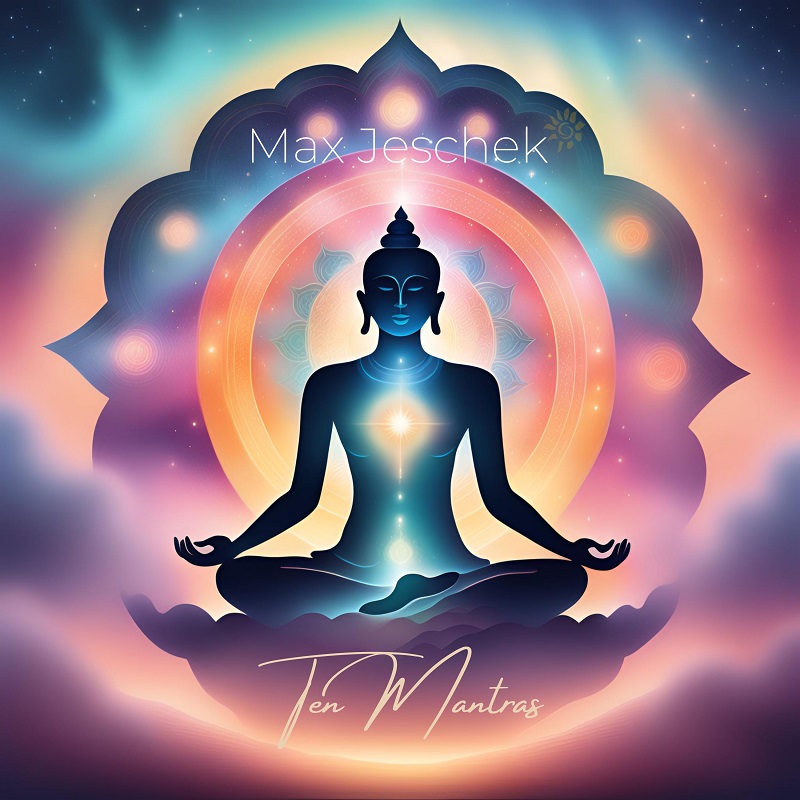Album Review—Ten Mantras by Max Jeschek
Facilitating Deeper Inward Journeys: The Musical Mantras of Max Jeschek on Guitar
I belong to a tradition where chanting and listening to mantras is a consistent part of our routine. Max Jeschek’s album title, Ten Mantras, sparked my curiosity and made me wonder what the title of this musical work suggested. Listening to the first track, I realized an inspiring experience was in store. As I journeyed through the tracks, I found that all ten mantras of the album were born from the artist’s vision and a deep insight into human consciousness. The entire listening experience was serene and felt enriching.
The Concept of Ten Mantras
A traditional definition of the mantra explains it as a sacred utterance, sound, or phrase, usually repeated to invoke a spiritual response or aid concentration during meditation. In the context of Max Jeschek’s album Ten Mantras, this concept appears central to its purpose. Each of these tracks has been composed to induce a meditative state and creates an ambience conducive to introspection and relaxation. I am sure; the album is a great accomplishment in the genre of acoustic music. Further, Jeschek’s masterful use of guitar notes endorses the versatile capabilities of this instrument in doing a fitting justice to music for contemplation. The mantra-like atmosphere created by the tracks transcends mere sound and promotes a sense of calm and reflection.
The Artist
Max Jeschek hails from Southern Germany and has global recognition as a skilled guitarist. His background is rooted in playful improvisation and melodic exploration. His proficient musical works have carved a niche in the New Age genre. Though Jeschek’s journey began with piano lessons, he ultimately found his voice through the guitar. His unique approach to playing on guitar emphasizes the importance of silence between the notes, which becomes a tool for him to achieve some rare possibilities in the realms of music for contemplation and relaxation. His exceptional ability to create a soothing soundscape has won him huge recognition, evident in his music being featured on various television and radio stations across Europe, the U.S., Australia, and Japan. His collaborations with notable composers like Kerani and Raphael Fimm tell us that his guitar work is not only exceptional but also versatile.

Analysis of the Tracks
Mantra of Cyclicity (5:39)
This opening track sets the tone for the album. The flowing melodies mimic the cyclical nature of life. We are enveloped in the artist’s warm guitar tone, experiencing a cradling effect. The repetitive motifs push the listener into a meditative state, aligning with Tolle’s interpretation that “the rhythm of life is a series of cycles”.
Mantra of Ease (4:44)
The second track is a soothing composition that encourages relaxation. The artist has used soft arpeggios to convey a sense of tranquility. The calming quality of the music reflects Chopra’s idea that “ease is the essence of life”, welcoming the audience to escape the stress and embrace peace.
Mantra of Continuity (3:25)
In the third mantra, Jeschek deals with the idea of continuity with the help of smooth transitions and lingering notes. The track emphasizes the interconnectedness of all experiences, aligning with Hawking’s perspective that “nothing in the universe is permanent, yet everything is interconnected”.
Mantra of Inner Rising (6:08)
This piece embodies a sense of awakening and growth. The rising melodies symbolize the emotional journey of self-discovery and reinforce Arthur C. Clarke’s belief that “the only way to find the limits of the possible is by going beyond them into the impossible”.
Mantra of Early Morning (5:27)
I felt the fifth track was an ode to the freshness of dawn. With the use of light and airy notes, the composer reflects on the concept of awakening the world. Jeschek’s skillful playfulness in this piece reflects Thich Nhat Hanh’s philosophy that “each day is a new beginning, a chance to start afresh”.
Mantra of Vitality (4:18)
Mantra of Vitality is a lively and refreshing composition and we feel the notes infuse new energy into us. The artist’s improvisations are spirited and remind us of Goleman’s quote, “Vitality is the driving force of creativity and life”.
Mantra of Self-Love (4:12)
This song gets into the depths of compassion and self-acceptance. We find the meditative quality of the piece beautifully aligning with Wilde’s principle that “to love oneself is the beginning of a lifelong romance”.
Mantra of Focus (5:00)
As the title suggests, this track aids concentration through its steady rhythms and crisp melodies. Jeschek employs pacing in this song deliberately in order to capacitate the listeners to invest in the power of concentration, echoing Dyer’s idea that “where focus goes, energy flows”.
Mantra of Change (5:16)
This composition deals with the inevitability of change. The dynamic shifts in melody suggest life’s transitions. This track resonates with Heraclitus’s idea that “change is the only constant”, enjoining the audience to accept the fluidity of existence.
Mantra of Infinity (5:44)
The closing track explores the vastness of experience and consciousness. The expansive soundscapes that Jeschek has created in this song talk of the limitless potentials of life, supporting Klein’s philosophy that “infinity is not a concept; it is a state of being”.
Conclusion
Ten Mantras is indeed a unique experiment in acoustic music. In these tracks, Jeschek has skillfully blended meditative moods with guitar improvisations. Though each track is composed of a distinct theme, the succession of tracks maintains a well-connected narrative that enables a state of mindfulness in the listeners. Max Jeschek’s proficient composition surfaces his technical mastery and also reflects his deep understanding of music as a medium for emotional and spiritual exploration. The album’s most unique sound, recorded at 432 Hz, magnifies its healing potential. Listening to these tracks, we are reminded of Tolstoy’s quote, “Music is the shorthand of emotion”. I strongly feel that Ten Mantras is a powerful call to slow down, reflect, and reconnect with oneself through the transformative power of sound.

 Single Review—Spiraling Up
Single Review—Spiraling Up  Album Review—Inner Sanctum
Album Review—Inner Sanctum  Album review—Back To My Roots
Album review—Back To My Roots  Album Review—Days of Gypsy Nights
Album Review—Days of Gypsy Nights